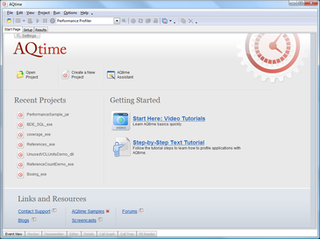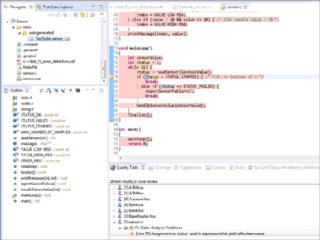Related Research Articles
A programming tool or software development tool is a computer program that software developers use to create, debug, maintain, or otherwise support other programs and applications. The term usually refers to relatively simple programs, that can be combined to accomplish a task, much as one might use multiple hands to fix a physical object. The most basic tools are a source code editor and a compiler or interpreter, which are used ubiquitously and continuously. Other tools are used more or less depending on the language, development methodology, and individual engineer, often used for a discrete task, like a debugger or profiler. Tools may be discrete programs, executed separately – often from the command line – or may be parts of a single large program, called an integrated development environment (IDE). In many cases, particularly for simpler use, simple ad hoc techniques are used instead of a tool, such as print debugging instead of using a debugger, manual timing instead of a profiler, or tracking bugs in a text file or spreadsheet instead of a bug tracking system.
PurifyPlus is a memory debugger program used by software developers to detect memory access errors in programs, especially those written in C or C++. It was originally written by Reed Hastings of Pure Software. Pure Software later merged with Atria Software to form Pure Atria Software, which in turn was later acquired by Rational Software, which in turn was acquired by IBM, and then divested to UNICOM Systems, Inc. on Dec 31, 2014. It is functionally similar to other memory debuggers, such as Insure++, Valgrind and BoundsChecker.
Compuware Corporation was an American software company with products aimed at the information technology (IT) departments of large businesses. The company's services also included testing, development, automation, and performance management software for programs running on mainframe computer systems. The company had its headquarters in Detroit, Michigan.
NuMega Technologies was a software company founded in 1987 by Frank Grossman and Jim Moskun in Nashua, New Hampshire, USA. The company developed a Kernel mode debugger, now SoftICE, for DOS and the Windows NT family.
Silk Test is a tool for automated function and regression testing of enterprise applications. It was originally developed by Segue Software which was acquired by Borland in 2006. Borland was acquired by Micro Focus International in 2009. The original name for the product from 1993 through 1996 was QA Partner.
DevPartner Fault Simulator is a software development tool used to simulate application errors. It helps developers and quality assurance engineers write, test and debug those parts of the software responsible for handling fault situations which can occur within applications. The target application, where faults are simulated, behaves as if those faults were the result of a real software or hardware problem which the application could face.
The Apple Developer Tools are a suite of software tools from Apple to aid in making software dynamic titles for the macOS and iOS platforms. The developer tools were formerly included on macOS install media, but are now exclusively distributed over the Internet. As of macOS 10.12, Xcode is available as a free download from the Mac App Store.
Dynamic program analysis is the analysis of computer software that is performed by executing programs on a real or virtual processor. For dynamic program analysis to be effective, the target program must be executed with sufficient test inputs to cover almost all possible outputs. Use of software testing measures such as code coverage helps ensure that an adequate slice of the program's set of possible behaviors has been observed. Also, care must be taken to minimize the effect that instrumentation has on the execution of the target program. Dynamic analysis is in contrast to static program analysis. Unit tests, integration tests, system tests and acceptance tests use dynamic testing.
Fault injection is a testing technique which aids in understanding how a system behaves when stressed in unusual ways. This technique is based on simulation's or experiment's result, thus it may be more valid compared to statistical methods.
BoundsChecker is a memory checking and API call validation tool used for C++ software development with Microsoft Visual C++. It was created by NuMega in the early 1990s. When NuMega was purchased by Compuware in 1997, BoundsChecker became part of a larger tool suite, DevPartner Studio. Micro Focus purchased the product line from Compuware in 2009. Comparable tools include Purify, Insure++ and Valgrind.
Parasoft is an independent software vendor specializing in automated software testing and application security with headquarters in Monrovia, California. It was founded in 1987 by four graduates of the California Institute of Technology who planned to commercialize the parallel computing software tools they had been working on for the Caltech Cosmic Cube, which was the first working hypercube computer built.

AQtime is a performance profiler and memory/resource debugging toolset developed by SmartBear Software. It is integrated into Microsoft Visual Studio, Visual Studio Test Projects and Embarcadero RAD Studio that allows analyzing the application without leaving the development environment.
GlowCode is a performance and memory/resource profiler developed by Electric Software Inc.

Parasoft C/C++test is an integrated set of tools for testing C and C++ source code that software developers use to analyze, test, find defects, and measure the quality and security of their applications. It supports software development practices that are part of development testing, including static code analysis, dynamic code analysis, unit test case generation and execution, code coverage analysis, regression testing, runtime error detection, requirements traceability, and code review. It's a commercial tool that supports operation on Linux, Windows, and Solaris platforms as well as support for on-target embedded testing and cross compilers.
Runtime error detection is a software verification method that analyzes a software application as it executes and reports defects that are detected during that execution. It can be applied during unit testing, component testing, integration testing, system testing, or penetration testing.
In computer science, language-based security (LBS) is a set of techniques that may be used to strengthen the security of applications on a high level by using the properties of programming languages. LBS is considered to enforce computer security on an application-level, making it possible to prevent vulnerabilities which traditional operating system security is unable to handle.
Quarkus is a Kubernetes native Java framework tailored for OpenJDK HotSpot and GraalVM. The goal of Quarkus is to make Java a leading platform in Kubernetes and serverless environments while offering developers a unified reactive and imperative programming model to optimally address a wider range of distributed application architectures.